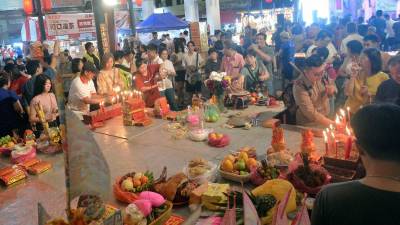PETALING JAYA: Each year during the Hungry Ghost Festival, pavements and street corners across Malaysia transform into makeshift shrines.
Small altars with fruits, pau, roasted chicken, sweets and folded joss paper line the streets, offerings to appease wandering spirits believed to roam the Earth during the seventh lunar month.
Also known as Zhong Yuan Jie, the festival is rooted in Taoist and Buddhist traditions.
According to Chinese belief, the “Gates of Hell” open on the first day of the lunar month, allowing spirits to visit the living world.
The 15th day marks the peak, when prayers, offerings and elaborate stage performances are held to honour and pacify restless souls before the gates close at the end of the month.
This year, the “Ghost Month” runs from Aug 23 to Sept 21, with the Hungry Ghost Festival observed yesterday.
Families carry out rituals to ward off misfortune and show respect to both ancestors and wandering spirits.
But as a recent Reddit discussion revealed, offerings do not always remain untouched, with stories ranging from comical to unsettling.
One user, @Final-Revolution-823, recounted a teenage incident.
“When I was 17, my school friend came to class with a big bag of candies and handed them out. Everyone thought it was just a treat, but when I asked where he got them, he said he picked them up on the way to school, not realising they were Hungry Ghost offerings outside people’s homes.”
For others, pets, rather than people, were causing trouble.
@AngelBear1107 described how their family dog once stole a pau from a neighbour’s altar.
To avert bad luck, their aunt rushed to the supermarket late at night, bought frozen pau, steamed them and quietly replaced the missing bun.
Another user, @SulkingOnion, shared a stranger tale.
“My dog took a bite of the offering a few years ago. Now, we occasionally see a second dog in the house, walking just out of sight before disappearing.”
Not all stories were light-hearted.
@Select_Yesterday8135 recounted how their mother once stepped on a pile of burned joss paper and suffered a month of misfortune afterwards.
Some contributors reflected on the deeper meaning of the rituals.
@TyrantRex6604 shared that offerings also serve a social function.
“In this way, society benefits. I also think people are eligible to take offerings. They are for the ‘hungry ghosts,’ not necessarily the dead.”
Meanwhile, @Jahlim explained that food offered during prayers is often shared later.
He added that a common superstition states that parents should never let children sit on the offering table as it may cause temporary illness.
Then, there are others who described unexplained occurrences.
@MoonMoon143 wrote how fruits on altars sometimes shrivelled overnight, while identical ones in the kitchen remained fresh.
For human resources executive Vanessa Chin, 27, the festival has always carried a sense of mystery.
“My parents told me it marks the opening of the ‘Gates of Hell,’ when spirits return to the human world,” she said.
Although her family does not observe the rituals, she has long been intrigued by Getai – colourful stage shows performed for both the living and the dead.
“These stages are often set up near neighbourhood shops, with singers or opera troupes performing. The front row of seats is always left empty for the spirits. I’ve never joined in properly as it always felt a little creepy,” she said.
Her parents also warned her not to touch offerings, adding that spirits would follow her if she did.
Other taboos, Chin added, include never tapping someone on the shoulder or turning around if your name is called from behind, superstitions that she feels make the festival distinctive.
For accountant Li Mei Ling, 29, the festival once centred on “feeding” deceased relatives through food and joss paper offerings.
While her grandparents observed the rituals strictly, her family has since grown less involved.
“As a child, I never dared touch the offerings because I was told spirits would chase me if I did.
“Today, it’s mostly the older generation that still follow them. For younger ones, it’s more of a tradition we notice but don’t really take part in.”
